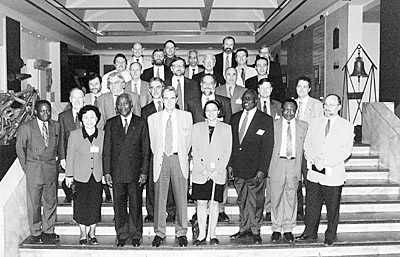


M. Timothy Obi, professeur de médecine vétérinaire au Département des sciences vétérinaires de l'Université d'Ibadan (Nigéria), a collaboré 12 mois avec la FAO dans le cadre du Programme des experts invités des établissements universitaires et instituts de recherche et continue d'assister l'Organisation.
Affecté au Groupe des maladies infectieuses du Service de la santé animale, M. Obi a travaillé en étroite coopération avec les composantes d'alerte et de réponse rapides du Système de prévention et de réponse rapide contre les ravageurs et les maladies transfrontières des animaux et des plantes (EMPRES) et participé à l'élaboration de trois manuels sur les maladies animales.
El Profesor Timothy Obi, Profesor de Medicina Veterinaria, del Departamento de Ciencias Veterinarias de la Universidad de Ibadán, Nigeria, colaboró durante doce meses con la FAO en el ámbito del Programa de expertos visitantes de instituciones académicas y de investigación y aún continúa prestando ayuda a la Organización.
Obi estuvo destinado al Grupo de Enfermedades Infecciosas, en el Servicio de Sanidad Animal (AGAH). Durante su misión trabajó en estrecho contacto con el sistema de prevención de emergencia EMPRES en sus componentes de alerta y de reacción rápida y fue coautor de tres manuales sobre enfermedades de animales.
![]()
Timothy Obi, Professor of Veterinary Medicine in the Department of Veterinary Sciences of the University of Ibadan, Nigeria, collaborated for 12 months with FAO under the Visiting Experts from Academic and Research Institutions Programme and is continuing to assist the Organization. Obi was assigned to the Infectious Diseases Group of the Animal Health Service (AGAH). During his assignment, he worked closely with the Emergency Prevention System for Transboundary Animal and Plant Pests and Diseases (EMPRES) in its early warning and early reaction components and was a co-author of three manuals: Recognizing peste des petits ruminants: a field manual; Manual on the preparation of national animal disease emergency preparedness plans; and Manual on the preparation of rinderpest contingency plans.
The effects of transboundary livestock diseases on rural incomes, production and trade in many countries are devastating and call for sustained international cooperation if they are to be eliminated. EMPRES, which was established 1994, promotes the effective

Timothy Obi (first row, second from right) with participants at the EMPRES Fourth Expert Consultation, held at FAO headquarters, Rome, from 24 to 26 May 1999 |
During his assignment, Obi collaborated with the early warning and early reaction components of EMPRES, particularly the Global Rinderpest Eradication Programme (GREP) and FAO's assistance to African countries coping with a spate of African swine fever emergencies. GREP has pledged to eradicate rinderpest by 2010. Rinderpest, for centuries probably the most devastating livestock disease, has now virtually been eradicated. But the disease still troubles parts of eastern Africa, the Near East and South Asia. Concerted action is needed to wipe out the last remnants of rinderpest, as well as emergency preparedness, so that the lethal disease cannot break out of these pockets again. Obi contributed his extensive experience in the epidemiology of rinderpest and peste des petits ruminants and the laboratory techniques involved in their diagnosis.
The manuals on rinderpest and generic emergency preparedness planning, co-written by visiting scientist Obi, FAO scientist Peter Roeder and retired Australian veterinary scientist Bill Geering, provide guidelines for rinderpest contingency planning for governments, an essential activity within GREP.
The peste des petits ruminants virus causes a rinderpest-like disease in sheep and goats that can cause high mortality and production losses in these species. Although first recognized in West Africa, it is now posing a threat to food security in other parts of Africa, the Near East and the Indian subcontinent. The manual Recognizing peste des petits ruminants will help control PPR by providing veterinarians, farmers and extension workers with a tool for its rapid recognition and diagnosis.
During his collaboration with FAO under the Visiting Experts Programme, Obi also assisted Malawi's national veterinary service in evaluating and modifying its foot-and-mouth disease emergency preparedness plan. The plan is needed to sustain and guide the country's actions for protection against the disease, which recently entered the country from the United Republic of Tanzania. A reoccurrence of the disease would be disastrous for Malawi's young dairy industry, now that the country is again free from the disease. Early application of the emergency preparedness principles that Obi helped to elaborate assisted Malawi in containing the disease close to the point of entry to eliminate it rapidly.